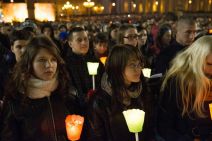40,000 young people gather in Rome for ecumenical Taize Community meeting

About 40,000 young people, including many of various Christian denominations, are gathering in Rome for six days of faith-related activities including prayer, reflection and experiencing life in local parishes as part of the 35th European Meeting of the ecumenical Taizé Community.
Brother Alois Löser, Prior of the community, said in a meditation published on Friday that those gathered are "all on the road to a more personal communion with God and to a deeper communion with one another."
The monastic community, which was established in 1940 in Taizé, France by Brother Roger Schutz is made up of over a hundred brothers, Catholics and from various Protestant backgrounds from around 30 nations.
"For Christians of all denominations, it is vital to respond in a new way to the question: why believe in God? In a world where trust in God is less and less self-evident, a personal answer to this question gives direction to our lives," he said.
Those at the Rome gathering, which runs from December 28 to January 2, will take part in six days of prayer, reflection and life with parishes, families and religious communities in and around the city.
Included in the program was a Saturday prayer event at St. Peter's Basilica where Pope Benedict XVI spoke to those gathered.
"A tireless witness to the Gospel of peace and reconciliation, ardently committed to an ecumenism of holiness, Brother Roger encouraged all those who passed through Taizé to become seekers of communion," Pope Benedict said.
"We should listen in our hearts to his spiritually lived ecumenism, and let ourselves be guided by his witness towards an ecumenism which is truly interiorized and spiritualized. Following his example, may all of you be bearers of this message of unity. I assure you of the irrevocable commitment of the Catholic Church to continue seeking the paths of reconciliation leading to the visible unity of Christians. And so this evening I greet with special affection those among you who are Orthodox or Protestants."
Brother Alois said the event would help strengthen Christian solidarity.
"In Rome we will discover indications of the continuity of the faith from the apostles down to the present day. And also, coming as we do from different nations and from different Christian denominations, we will deepen our solidarity, at a moment in history when material difficulties are fostering fear and withdrawal," he said.
He said the gathering "will open wide the doors of trust and solidarity." He urged each person to "undertake a kind of inner pilgrimage these days, uncovering in ourselves the wellsprings of trust in God."
Part of the activities involve the consideration of several "proposals" which include individuals discussing their faith journey, looking for ways to encounter Christ, looking for ways of relying on God, and being open without fear to the future and to others.
Christian leaders from various churches and organizations extended greetings to participants ahead of the event.
The World Council of Churches' Secretary General, the Rev. Dr. Olav Fykse Tveit cited the biblical passage in John 17:21, which was the prayer of Jesus Christ that his disciples may be one so that the world may believe.
He said the prayer "provides a strong foundation fo us, in view of the challenges our societies face today. It is a prayer often used in ecumenical circles, as it provides the root of any possible Christian unity and a deepening of our trust in God. We are one as Christians because we receive the same gift of God's "being with us and for us" through Jesus Christ."
"You may ask what does it mean to be one? To be one is to take counsel together, to pray and reflect together and join forces on common issues. To be one is to stand up for one another; to step out of our own interests - for the other, for a higher cause of unity; to stand together in the whole mission of God. We are so much stronger together."
Patriarch Bartholomew of Constantinople, the most senior of the various Orthodox Churches, said the 35th anniversary of the meeting means ecumenism is active today.
"This fact alone invalidates the most pessimistic considerations that tend to relegate ecumenism to the failed initiatives of history. If we can say, contrary to popular opinion, that ecumenism has not broken down, this is primarily because it is supported by the lifeblood of your youth," he said.